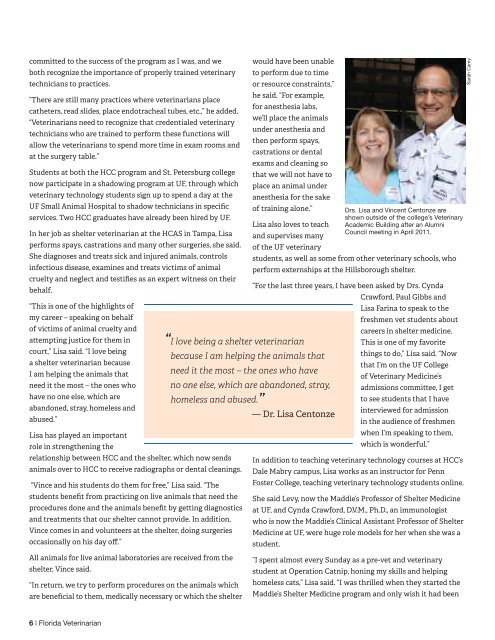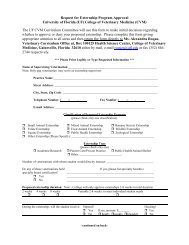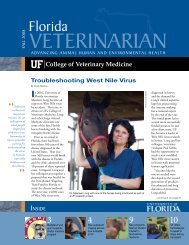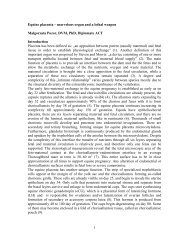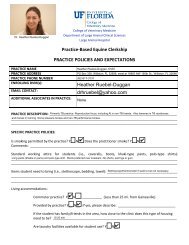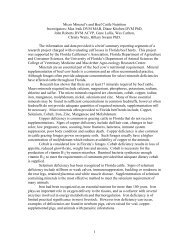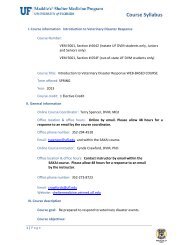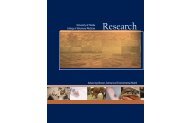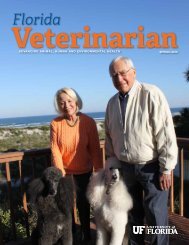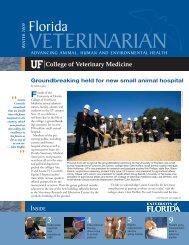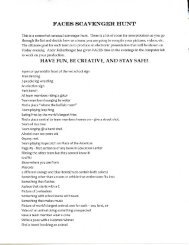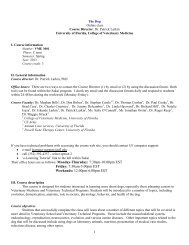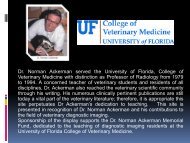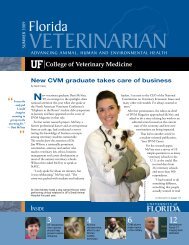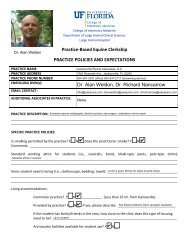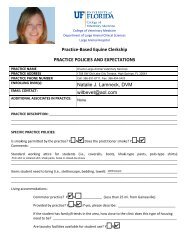Florida Veterinarian, Winter 2012 (PDF) - University of Florida ...
Florida Veterinarian, Winter 2012 (PDF) - University of Florida ...
Florida Veterinarian, Winter 2012 (PDF) - University of Florida ...
You also want an ePaper? Increase the reach of your titles
YUMPU automatically turns print PDFs into web optimized ePapers that Google loves.
committed to the success <strong>of</strong> the program as I was, and we<br />
both recognize the importance <strong>of</strong> properly trained veterinary<br />
technicians to practices.<br />
would have been unable<br />
to perform due to time<br />
or resource constraints,”<br />
he said. “For example,<br />
“There are still many practices where veterinarians place<br />
for anesthesia labs,<br />
catheters, read slides, place endotracheal tubes, etc.,” he added.<br />
we’ll place the animals<br />
“<strong>Veterinarian</strong>s need to recognize that credentialed veterinary<br />
under anesthesia and<br />
technicians who are trained to perform these functions will<br />
then perform spays,<br />
allow the veterinarians to spend more time in exam rooms and<br />
castrations or dental<br />
at the surgery table.”<br />
exams and cleaning so<br />
Students at both the HCC program and St. Petersburg college<br />
now participate in a shadowing program at UF, through which<br />
veterinary technology students sign up to spend a day at the<br />
UF Small Animal Hospital to shadow technicians in specific<br />
services. Two HCC graduates have already been hired by UF.<br />
In her job as shelter veterinarian at the HCAS in Tampa, Lisa<br />
performs spays, castrations and many other surgeries, she said.<br />
that we will not have to<br />
place an animal under<br />
anesthesia for the sake<br />
<strong>of</strong> training alone.”<br />
Lisa also loves to teach<br />
and supervises many<br />
<strong>of</strong> the UF veterinary<br />
Drs. Lisa and Vincent Centonze are<br />
shown outside <strong>of</strong> the college’s Veterinary<br />
Academic Building after an Alumni<br />
Council meeting in April 2011.<br />
She diagnoses and treats sick and injured animals, controls<br />
infectious disease, examines and treats victims <strong>of</strong> animal<br />
students, as well as some from other veterinary schools, who<br />
perform externships at the Hillsborough shelter.<br />
cruelty and neglect and testifies as an expert witness on their<br />
behalf.<br />
“This is one <strong>of</strong> the highlights <strong>of</strong><br />
my career – speaking on behalf<br />
“For the last three years, I have been asked by Drs. Cynda<br />
Crawford, Paul Gibbs and<br />
Lisa Farina to speak to the<br />
freshmen vet students about<br />
<strong>of</strong> victims <strong>of</strong> animal cruelty and<br />
careers in shelter medicine.<br />
attempting justice for them in<br />
“ I love being a shelter veterinarian<br />
This is one <strong>of</strong> my favorite<br />
court,” Lisa said. “I love being<br />
because I am helping the animals that<br />
things to do,” Lisa said. “Now<br />
a shelter veterinarian because<br />
that I’m on the UF College<br />
I am helping the animals that<br />
need it the most – the ones who have<br />
<strong>of</strong> Veterinary Medicine’s<br />
need it the most – the ones who no one else, which are abandoned, stray, admissions committee, I get<br />
have no one else, which are<br />
homeless and abused. ”<br />
to see students that I have<br />
abandoned, stray, homeless and<br />
interviewed for admission<br />
— Dr. Lisa Centonze<br />
abused.”<br />
in the audience <strong>of</strong> freshmen<br />
Lisa has played an important<br />
role in strengthening the<br />
relationship between HCC and the shelter, which now sends<br />
animals over to HCC to receive radiographs or dental cleanings.<br />
“Vince and his students do them for free,” Lisa said. “The<br />
students benefit from practicing on live animals that need the<br />
procedures done and the animals benefit by getting diagnostics<br />
and treatments that our shelter cannot provide. In addition,<br />
Vince comes in and volunteers at the shelter, doing surgeries<br />
occasionally on his day <strong>of</strong>f.”<br />
All animals for live animal laboratories are received from the<br />
shelter, Vince said.<br />
“In return, we try to perform procedures on the animals which<br />
are beneficial to them, medically necessary or which the shelter<br />
when I’m speaking to them,<br />
which is wonderful.”<br />
In addition to teaching veterinary technology courses at HCC’s<br />
Dale Mabry campus, Lisa works as an instructor for Penn<br />
Foster College, teaching veterinary technology students online.<br />
She said Levy, now the Maddie’s Pr<strong>of</strong>essor <strong>of</strong> Shelter Medicine<br />
at UF, and Cynda Crawford, D.V.M., Ph.D., an immunologist<br />
who is now the Maddie’s Clinical Assistant Pr<strong>of</strong>essor <strong>of</strong> Shelter<br />
Medicine at UF, were huge role models for her when she was a<br />
student.<br />
“I spent almost every Sunday as a pre-vet and veterinary<br />
student at Operation Catnip, honing my skills and helping<br />
homeless cats,” Lisa said. “I was thrilled when they started the<br />
Maddie’s Shelter Medicine program and only wish it had been<br />
Sarah Carey<br />
6 | <strong>Florida</strong> <strong>Veterinarian</strong>


